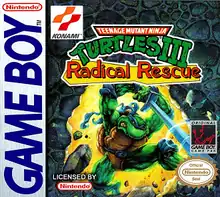Teenage Mutant Ninja Turtles III: Radical Rescue
Teenage Mutant Ninja Turtles III: Radical Rescue, released as Teenage Mutant Hero Turtles III: Radical Rescue in Europe, and Teenage Mutant Ninja Turtles 3: Turtles Kiki Ippatsu[lower-alpha 1] in Japan, is a Game Boy game by Konami, released in November 1993. It is the third Game Boy game based on the Teenage Mutant Ninja Turtles, following Teenage Mutant Ninja Turtles: Fall of the Foot Clan and Teenage Mutant Ninja Turtles II: Back from the Sewers. The game was re-released as part of Teenage Mutant Ninja Turtles: The Cowabunga Collection in 2022.[2]
| Teenage Mutant Ninja Turtles III: Radical Rescue | |
|---|---|
 North American cover art | |
| Developer(s) | Konami |
| Publisher(s) | Konami |
| Director(s) | Hiroyuki Fukui |
| Programmer(s) | Masatsugu Nagata Yasufumi Fukui |
| Artist(s) | Chisa Matsuda Masashi Sakurai |
| Composer(s) | Akihiro Juichiya |
| Series | Teenage Mutant Ninja Turtles |
| Platform(s) | Game Boy |
| Release | |
| Genre(s) | Platform game, Metroidvania[1] |
| Mode(s) | Single player |
Gameplay
The player begins the game by taking control of Michaelangelo, who must rescue the other turtles, along with Splinter and April O'Neil, who have been kidnapped by Shredder.[3] Unlike other games based on the franchise, this is a scrolling action-adventure game reminiscent of Metroid, Konami's own The Goonies II and the later Castlevania: Symphony of the Night. Each turtle has a different ability which is necessary to finish the game. Michaelangelo can hover using his nunchakus as a helicopter, Leonardo can drill the floor by spinning with his katana, Raphael can hide himself inside his shell to enter passages that are otherwise too small to enter, and Donatello can stick to and climb walls.
The bosses are Scratch, Dirtbag, a Triceraton, Scale Tale, and Shredder (in this game known as Cyber-Shredder).
Reception
| Publication | Score |
|---|---|
| Computer and Video Games | 90/100[4] |
| Famitsu | 18/40[5] |
| Game Players | 86%[6] |
| GamePro | |
| Joypad | 89%[8] |
| M! Games | 70%[9] |
| Mega Fun | 65%[10] |
| Nintendo Power | 3.5/5[lower-alpha 2] |
| Official Nintendo Magazine | 66%[12] |
| Total! | 78%[13] |
| Video Games (DE) | 65%[14] |
| GB Action | 79%[15] |
Notes
References
- Szczepaniak, John. "Backtracking: The History of Metroidvania". GamesTM. No. 116. Imagine Publishing. pp. 148–53.
- Bailey, Kat (July 21, 2022). "Teenage Mutant Ninja Turtles: The Cowabunga Collection Has a Release Date". IGN. Retrieved August 29, 2022.
- "Teenage Mutant Ninja Turtles III: Radical Rescue (Game Boy)". Mobygames. 1993. Retrieved 1 December 2015.
- Tipping, Amanda; Rand, Paul (November 1993). "Turtles 3". Computer and Video Games. No. 144. p. 103. Retrieved June 27, 2021.
- "T.M.N.T. 3 タートルズ危機一発". Famitsu (in Japanese). No. 259. ASCII Corporation. December 3, 1993. p. 42.
- Gagnon, Jonathan (February 1994). "Teenage Mutant Ninja Turtles III: Radical Rescue". Game Players. No. 37. pp. 62, 64. Retrieved June 27, 2021.
- TMNat Radical Rescue Gamepro Review (PDF).
- Olivier; Trazom (December 1994). "Teenage Mutant Ninja Turtles III: Radical Rescue". Joypad (in French). No. 28. pp. 112–113. Retrieved June 27, 2021.
- "Teenage Mutant 3". MANIAC (in German). November 1993. p. 76. Retrieved June 27, 2021.
- Martin (December 1993). "Turtles 3". Mega Fun. p. 114. Retrieved June 27, 2021.
- "Now Playing". Nintendo Power. No. 56. January 1994. pp. 102–107. Retrieved June 27, 2021.
- "Turtles III: Radical Rescue". The Incredible NMS Review Guide of the Year. 1994. p. 124. Retrieved June 27, 2021.
- Chris (January 1994). "Teenage Mutant Ninja Turtles 3: Radical Rescue". Total!. No. 25. pp. 74–75. Retrieved June 27, 2021.
- "Radical Rescue". Video Games (in German). December 1993. p. 130. Retrieved June 27, 2021.
- Smith, Rob (January 1994). "Teenage Mutant Ninja Turtles III". GB Action. No. 21. pp. 18–19. Retrieved June 27, 2021.